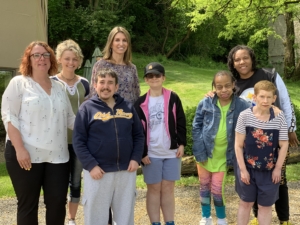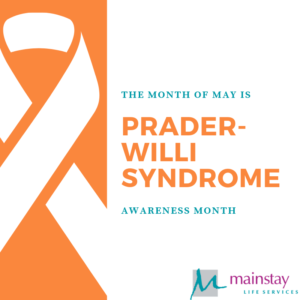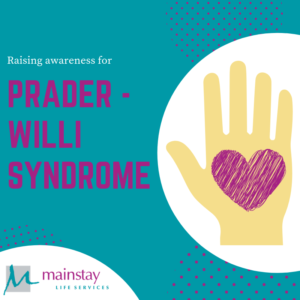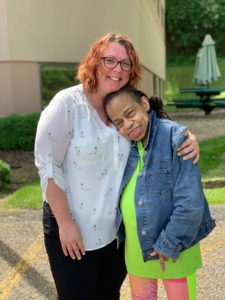
Back Row: Jennifer Dayton, Ashley Boeringer, Kim Sonafelt, Sharon Wilson Front Row: Brandon W., Lindsay K., April H., Melanie B.
Before joining the Mainstay family, I was certainly aware of Prader-Willi Syndrome (PWS). However, it was not until I met and really spent time with people with PWS that I truly understood how remarkable they are. You see, living with PWS means you feel hungry most of the time and your food is constantly managed by people who love you to ensure you will not eat to the point of a life-threatening complication. You exercise every day – actually you exercise twice a day, every day for 40 to 45 minutes. I decided that for one week I was going to try and exercise twice a day for 40 minutes (I figured I would start at the lowest end). I have to admit, when I started, I thought I would be able to achieve my goal since I am a daily runner and I actually love to exercise. Well, by day three, I was already struggling. It takes a lot of dedication and will power to commit to working out twice a day. I did make it to the end of my seven-day challenge, but not before coming to realize what an inspiration these men and women were to me.
 Most people make a New Year’s resolution to work out more often or eat less. For people with PWS, this is not a resolution they can break – it really is a life or death situation for them. I realized most of us take for granted that food is everywhere. In most social situations, offices, and family gatherings, food is always around. These remarkable people pack their own lunches when they work and try to avoid places where they know food will be everywhere. It is sometimes a daily struggle and, like all of us, there are good days and there are bad days. However, I know that no matter what day it is – good or bad – we will be here because that is what family does.
Most people make a New Year’s resolution to work out more often or eat less. For people with PWS, this is not a resolution they can break – it really is a life or death situation for them. I realized most of us take for granted that food is everywhere. In most social situations, offices, and family gatherings, food is always around. These remarkable people pack their own lunches when they work and try to avoid places where they know food will be everywhere. It is sometimes a daily struggle and, like all of us, there are good days and there are bad days. However, I know that no matter what day it is – good or bad – we will be here because that is what family does.
At Mainstay, we pride ourselves on providing high-quality supports for the unique needs of people with PWS. In light of May being Prader-Willi Syndrome Awareness Month, we want to help give a better understanding of this disorder, and help those affected get the support they need to have healthy futures and live fully in their communities.
At this point you probably have some questions, so let’s get started:
What exactly is PWS?
PWS is a rare and complex genetic disorder that causes a person to have a chronic feeling of hunger. PWS also impacts metabolism, growth, behavior and cognitive function. Characterized by intellectual disabilities, short stature and low muscle tone, it is the feeling of insatiable hunger that can lead to aberrant behavior, excessive overeating and life-threatening obesity.
How many people have PWS?
According to the Prader-Willi Syndrome Association (USA), an estimated one in 12,000 to 15,000 people worldwide lives with PWS. It can occur in any family, in both males and females, and in people of all races. Although PWS is rare, it is one of the most common genetic causes of obesity.
What causes PWS?
While there is no known cause for why PWS occurs, we know how it occurs.
PWS results from the lack of several genes on chromosome 15. Typically, an individual should receive one chromosome 15 full of genes from their mother and one from their father. However, for someone with PWS, during the chromosome pairing process, critical genes from the father’s chromosome 15 are inexplicably deleted. In some cases, the chromosome is missing entirely and the individual has two chromosome 15s from the mother. Both of these scenarios affect the ability of the body to regulate appetite.
In addition to the chromosomal explanation for lack of appetite control, people with PWS also have an abnormality in the hypothalamus area of the brain, which registers the feeling of hunger, as well as the satiety of that hunger. This leaves a person with PWS unable to control their appetite and unable to feel when their body is full after eating.
What is Mainstay doing to help people with PWS?
Mainstay is proud to operate five community homes in the Pittsburgh area specifically designed for people with PWS. Our first home opened in 2000, and its success and demand for our services led to our opening four additional homes in subsequent years.
 Through our valued partnership with the Children’s Institute of Pittsburgh, we have received training and consultation to help us address the unique needs of people with PWS through careful meal planning, safety modifications, regular exercise and 24-hour care.
Through our valued partnership with the Children’s Institute of Pittsburgh, we have received training and consultation to help us address the unique needs of people with PWS through careful meal planning, safety modifications, regular exercise and 24-hour care.
We work not only with the people receiving our support, but also with their families, supports coordinators and medical professionals to ensure we are providing the best care for each person’s unique needs.
Mainstay is dedicated to helping people with PWS unlock their full potential and achieve healthy futures in their communities. As we wrap up Prader-Willi Syndrome Awareness Month, I urge you to educate yourself and others on PWS and help us raise awareness of the daily challenges and triumphs of these remarkable people.
-Kim Sonafelt, CEO, Mainstay Life Services
Check out how Mainstay has made a difference in the life of someone living with PWS here: https://mainstaylifeservices.org/aprils-story/.
Learn more about Mainstay’s PWS Supports here: https://mainstaylifeservices.org/residential-services/pw-syndrome-supports/
For more general information about PWS facts, research and news, visit: https://www.pwsausa.org/
Sources Cited: https://www.pwsausa.org/basic-facts/



0 Comments